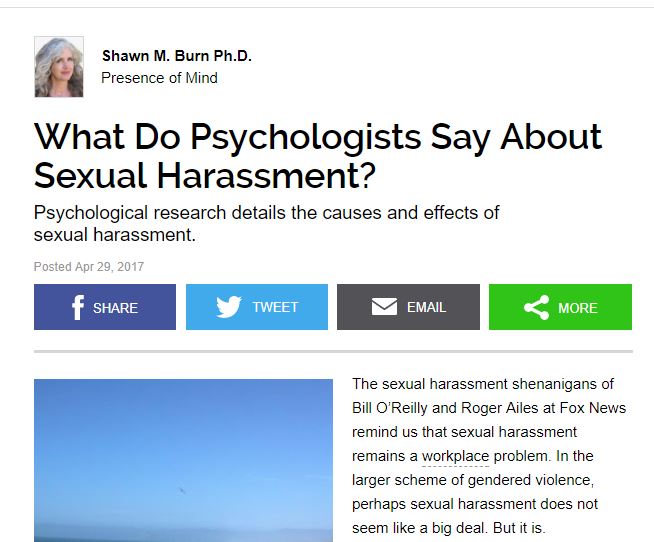Sexual Harassment Stinks! | #METOO
Remember this guy? It was our favorite Casanova skunk, Pepé Le Pew. What baby boomer (and I’m sure some of the younger generations) didn’t grow up on these iconic Warner Brothers cartoons? I remember racing home after school to watch Bugs Bunny, Porky the Pig, and Tweety Bird (“I tot I taw a puddy tat!”), and I have to admit, I still love these low-tech, grainy cartoons. But watching them now sometimes makes me cringe a little. The casual violence of Wile E. Coyote and the Roadrunner cartoons has been credited for damaging our tender 1960s psyches, but did these Looney Tunes and Merrie Melodies shape or merely reflect our culture?
Back to Pepé. (Wasn’t he cute?) We rolled with laughter at his persistent chasing of the virtuous Penelope Pussycat, who appeared to Pepé to be a beautiful girl skunk due to her accidental encounters with white paint that somehow always conveniently left a white stripe down her back. Penelope was sweet and naive with huge, swoony eyes that were absolutely irresistible to poor, love-starved Pepé. He was in desperate pursuit of Penelope’s love and admiration, but not very successful in getting her to love him back. For one thing, he was a skunk. Skunks stink. He was also so aggressive with his amorous gestures that he scared the shy, defenseless Penelope, who spent most of her life trying to get away from him.
So, what’s a hot-blooded, ego-centric skunk supposed to do? Being the narcissist he is, the excitement is in the chase, and sweet little Penelope keeps him on his toes as she dodges and resists his lecherous advances. Pepé, who never gives up, turns to his secret weapon: emotional manipulation.
I must say that I was shocked to see a clip of one episode recently in which Pepé, in his usual pursuit of Penelope, was not making headway, as she pretended to ignore him from behind a glass panel. Not one to give up easily (or ever), Pepé quickly pulls a handgun from his fur pocket, points it at his temple, and walks sadly out of her view. We suddenly see a red cartoon-cloud explosion, and Penelope freaks out, traumatized. She quickly opens the door because she feels responsible for this tragedy, and runs to see what happened, only to find herself tripping into Pepé’s open arms. With a self-satisfied look on his face, Pepé purrs into her face, “I meesed, fortunately for you.”
Isn’t she the lucky one? This was all so funny, back when I was a kid. It’s not so funny now, and it really wasn’t then either. Joking about suicide is never funny, and threatening to kill oneself over unrequited love is the ultimate power card of emotional manipulation.
Emotional manipulation, by definition, is “a type of social influence that aims to change the behaviors or perceptions of others through abusive, deceptive, or underhanded tactics.
Emotional manipulation advances only the interests of the manipulator, most often at another’s expense. It is exploitative, abusive, devious and deceptive. (Thank you, Wikipedia.) And it most often works on people who are empathetic, generous, kind and vulnerable.
In light of recent news exposing decades of sexual harassment in Hollywood (and that no one is shocked by the revelations), it’s time to once again talk about the beliefs and behaviors in our society that support it. In what they’re now calling the “Weinstein Ripple Effect”, more and more women are coming forward with their own stories of sexual harassment.
This is important. Many of us have experienced it at some time in our lives. I have had it happen to me several times, and I can tell you that when you are the target of abuse, it sometimes isn’t easy to know what to do about it.
We feel shame. We feel scared. We feel powerless. We feel traumatized. We feel depressed.
Any one of those feelings has the power to shut a person down. Add all of them together, and you get victims responding in ways that guarantee survival only: keeping quiet, blaming themselves, avoiding confrontations, and staying small. And all of this promotes an ongoing cultural norm of abuse and domination of women, which is exactly what perpetrators want.
Now that some brave women have found the courage to speak out, it is our responsibility, both women and men, to keep this form of gender violence in the forefront of our world’s collective consciousness. We can start by calling it what it really is: SEXUAL and GENDER VIOLENCE. The term “sexual harassment” isn’t a powerful enough name; it’s a legal term. The word “harassment” sounds like little more than “pressure.” Sexual harassment is something much, much more.
In an April 29, 2017 article published in Psychology Today, Psychologist Louise Fitzgerald and her colleagues identified three behavioral dimensions of sexual harassment.
The first, “gender harassment” refers to verbal and nonverbal behaviors that convey insulting, hostile, and degrading attitudes toward women such as questioning women’s competence for a particular job, displaying pornography, calling women “bitches,” and making obscene gestures.
Second, “unwanted sexual attention” includes suggestive comments about a woman’s body as well as unsolicited and unreciprocated sexual advances. And finally, “sexual coercion” refers to requiring sex as a condition of employment or job rewards. Legally, it is often called quid pro quo sexual harassment.
Sexual violence doesn’t just happen in offices.
It can happen on the streets when you are walking down the sidewalk, minding your own business and some guy thinks it’s okay to whistle, or make a comment about your looks, your body, or whatever is in his mind. It happens in doctor’s offices when you are there as a patient. (This happened to me.)
It happens in homes, cars, schools. It happens everywhere. And contrary to what some want us to believe, we are not flattered by this un-asked-for attention, whether it is a mere whistle by an ogler who thinks he’s doing you a favor, or a “casual” touch anywhere on your body that gives you the heebie- jeebies. It’s also a complete myth that every kind of sexual overture results from an uncontrollable sexual urge or desire on the part of males. Human beings have great capacity to control how they choose to act on or express sexual urges. This is evidenced by all of the instances within our daily interactions in which sexual feelings or behaviors are NOT driving the bus—for example, in public, or in the presence of one’s mother. (“Mind your manners, Junior!”)
Sexual violence—any sexual violence--is motivated by power, control, and often hostility.
It keeps women in a subservient, “less-than” position in societies dominated by men. With the recent surge of calling out this archaic treatment of others, we can no longer look the other way. We will no longer keep it in the shadows. Sexual violence doesn’t just happen to women, but the vast majority of victims are women.
A movement has begun, and it is our time to change the status quo.
We at The Villa will be right here with you, every step of the way. Tell us your stories (send to villaleadership@gmail.com), or reach out to others in our community who can listen, support and strengthen you. We passionately believe that telling your own stories will empower and enlighten you and others, and is the most effective way to move the needle of systemic change.
When we remain quiet, we remain victims. When we speak out, we give ourselves the chance to heal and move forward. Let’s band together, tell our stories, and be a force for evolution.
Send your #metoo and #perfectisboring stories to villaleadership@gmail.com. There is power in sharing!




